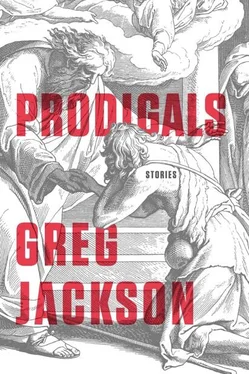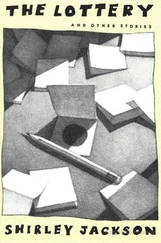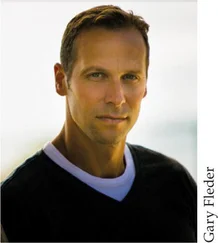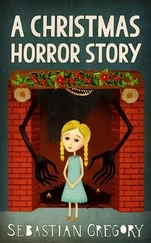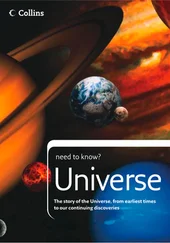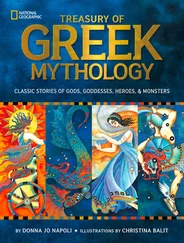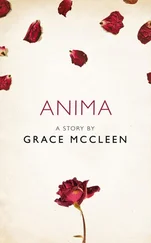* * *
We left for Joshua Tree that morning. It was the same day it always was, but that day was beautiful, and the wind farms spun and the mountains gave up their passes and although the park was busy by the time we got there we didn’t care. We climbed a rock pile, ate a sandwich bag of mushrooms, and lay contented in the sun. There were families around, white families and Latino families and Asian families, and everyone said “Happy New Year,” all of us pleased, it seemed, that we had something to say to one another. There were people rock climbing and tightrope walking on a distant butte, and we hiked over to them as distances took on a subtle fun-house deception and the rocks grew more interesting and our bodies less reliable. The sun tore through the tissue of the sky. The stone-littered ocher valley below recalled a time when humans and dinosaurs shared the earth — not a real time, I’m not stupid, but the time in our collective imagination when we were the scrappy dreamers and they were the powerful monsters and we all had a lot more business with volcanoes.
The tightrope walkers had their lines stretched at the top of a bluff, we saw, thirty or forty yards across an open chasm. They were a group of Gen-Y hippies, most of them shirtless in rolled-up canvas pants, making coffee in AeroPresses and practicing qigong while an Alaskan Klee Kai ran from one cliff edge to the next. I sat because my balance was shot and watched in rapt dread as the bohemian boys and girls scooted out onto the ropes on their butts, stared at the horizon to find their point of balance or stability or Zen, and raised themselves, waving their hands back and forth above them in a sort of willed precession. I kept expecting them to fall, but they never did.
Half an hour later we were eating lunch on the low wall of a lookout. From where we were sitting you could see down into the Coachella Valley to the south, see the Salton Sea and the San Andreas Fault, which ran like a post-Impressionist margin in the landscape. I was mostly focused on my sandwich, though, the way the Gala apple and country-style mustard interacted with the sharp white cheddar and the arugula, how the tastes all came together and produced nuances in their interaction that I had never encountered before. I thought I had never been happier than eating this cheese-and-arugula sandwich.
I was tripping very deeply and beautifully, and I strolled to the top of a sightseeing hillock. It must have been the presence of another Hasid there that accounted for the turn my thoughts took, because I remember thinking, You and I are not so different. We are desert people, sons of a Trimalchio race. We come to places like this where there is nothing and don’t see nothing. We see a long trailing history of wandering and persecution and the melancholic fruits of so much lineal sharpening. But then I remembered the truth, which was that I didn’t really have a “people” or a “race,” not as such; I was a mutt, like everyone, except Lyle, who is purebred and not a person, and whatever confluent strands produced me or anyone had their own chapters of persecution and oppression — or, to be less polite-society about it, of rape and forced labor and murder — and what we seemed always to forget is that our sense of what a person is rests on our latent sense of what a slave is, even today.
I felt a sort of sigh pass through me, and although I knew it would make up for exactly nothing, historically speaking, what seemed important to me just then was that everyone got his or her own cheese-and-arugula sandwich. “Pretty amazing,” I said to my fellow gazer, and I was briefly proud of myself for coming up with something so appropriate to say, when the gazer turned and I saw he was not a Hasid after all, just a teenager in a black hoodie, and he looked at me and his eyes said, unmistakably, “You can do one of two things right now, and both of them are to go fuck yourself.” And I thought, Well, okay. You’re sixteen. I’d probably feel the same way. And then I thought I had to shit very badly, so I went to the single-occupancy bathroom and waited with a twelve-year-old boy while his mother shat inside. And that seemed poignant to me too, his waiting for his mother, our uneasy and yet companionable waiting, and for a second it occurred to me that perhaps I was traveling back to my own birth along a sequence of encounters with boys of diminishing ages. But no, I wasn’t. And in the end it turned out I didn’t even have to shit, I just had a stomachache.
The early evening was upon us, a dwindling and rapturous light invigorating the mountains as we debouched from the hills, descending to the Cholla Cactus Garden and the smoldering twilit valley below. The cactuses themselves appeared to glow, as round and chartreuse as tennis balls, the air wholesome with a hovering feculence, the play of shadows on the far slopes giving them the cast of spalted wood. We stood together, smiling in goofy acquiescence at all we felt and lacked the words to speak. We ate the last caps and stems of the mushrooms. We were high, but we weren’t courting death. We were just some nobody hustlers in the desert, trying to make a film about the economist Albert O. Hirschman, trying to read a poem and be present together and save the shards of hearts splintered many times in incautious romance from further comminution, trying to keep up with our Instagram and Twitter feeds and all the autodocumentary imperatives of the age, trying to keep checking items off our private bucket lists because pretty soon we would have babies and devote our lives to giving them the right prods and cushioning so that they could grow up to be about as bad and as careful as we were, and avoid stepping with too big a carbon footprint on our African and Asian brothers and sisters and the Dutch. We were looking for a moment, not a perfect moment but a moment in which the boundaries of ourselves and the world grew indistinct and began to overlap, to share an easement that in days past might have been called spirituality, so that we could see ourselves as dull integers before the mantissas of history and take refuge in a moment’s togetherness, a kindness done in secret, in patient listening and unrequited oral sex. We were not heroes. We were trying to find ways not to be villains.
The sun was setting and we were rising — me, Marta, Eli, and Lily — the four of us in a Prius, experiencing a transcendental glee and hoping that the other half of life was gone for good. It wasn’t, of course. In time it would return. But first I would wander around the plein-air Palm Springs airport that night with a vague sense that I was at a golf tournament, and watch the yellowed planes above the Denver airport hover as bright and still as fireflies. And I would wonder what they did with the burnt glass in our fireplace, whether they threw it out, replacing it with fresh glass, or if they just raked it under. And before even that we had the long ride back through Twentynine Palms and the towns of Joshua Tree and Yucca Valley, the whole thing one unbroken span of luminous development, or so it seemed, more beautiful than you can imagine.
We were listening to a late Beatles album very loud, finding folds within the music that seemed never to have been there before and unlikely to be there again. I could not get over the fact that what we were hearing were the actual hands of these men falling on their instruments half a century ago. Lily, every few minutes, burst out laughing wildly, I don’t know why. We petted each other a little, sensually, asexually, then we passed into the Coachella Valley, swept down, down into the vast grid of lights, so many colors, all communicating with one another in a lattice of shifting and persistent harmony. And as we came down from the risen pass and returned to the valley floor, where the windmills blinked red and the stars through our open windows were small rounded jewels in the great velvet scrim of night, Lily spoke.
Читать дальше
